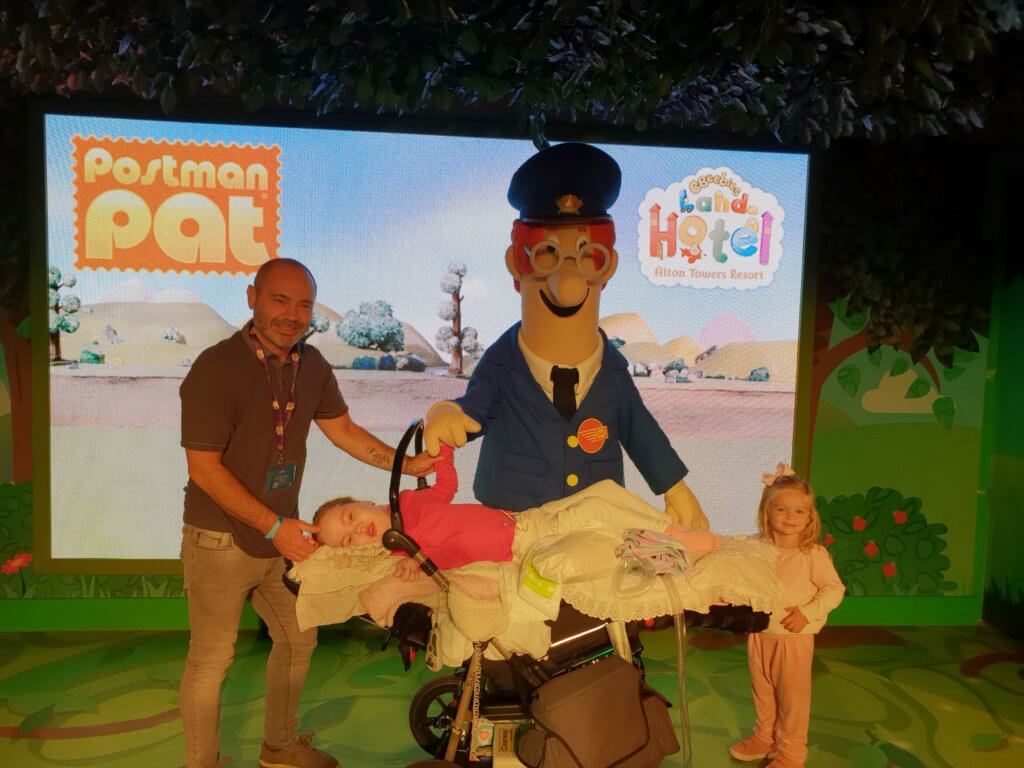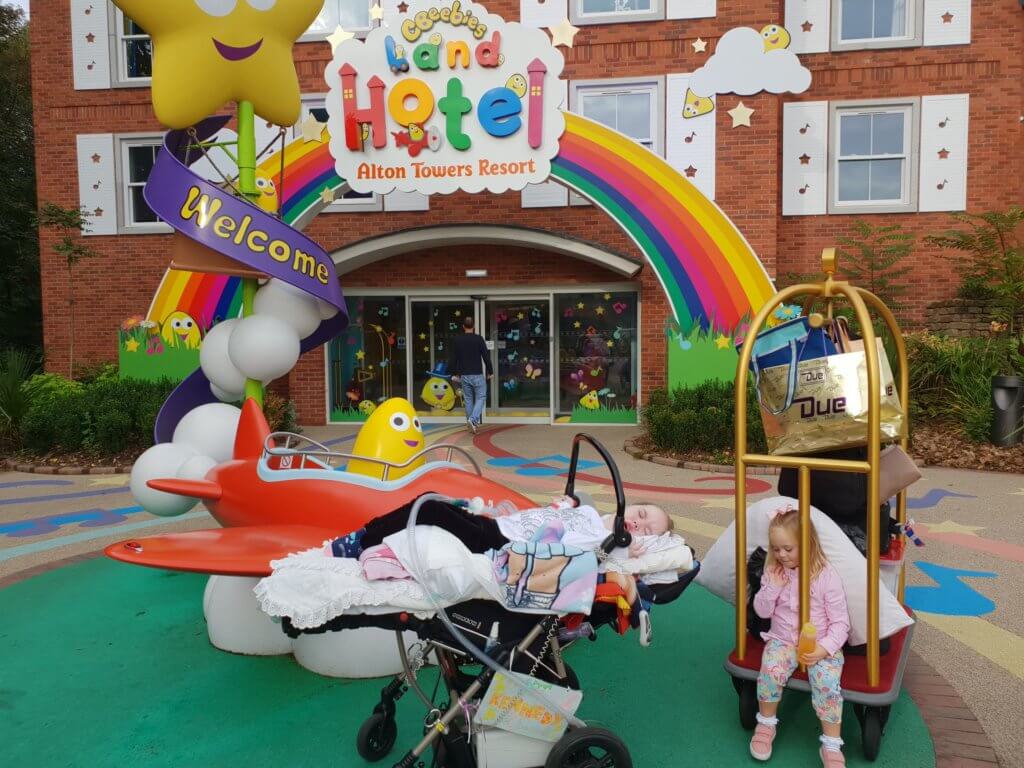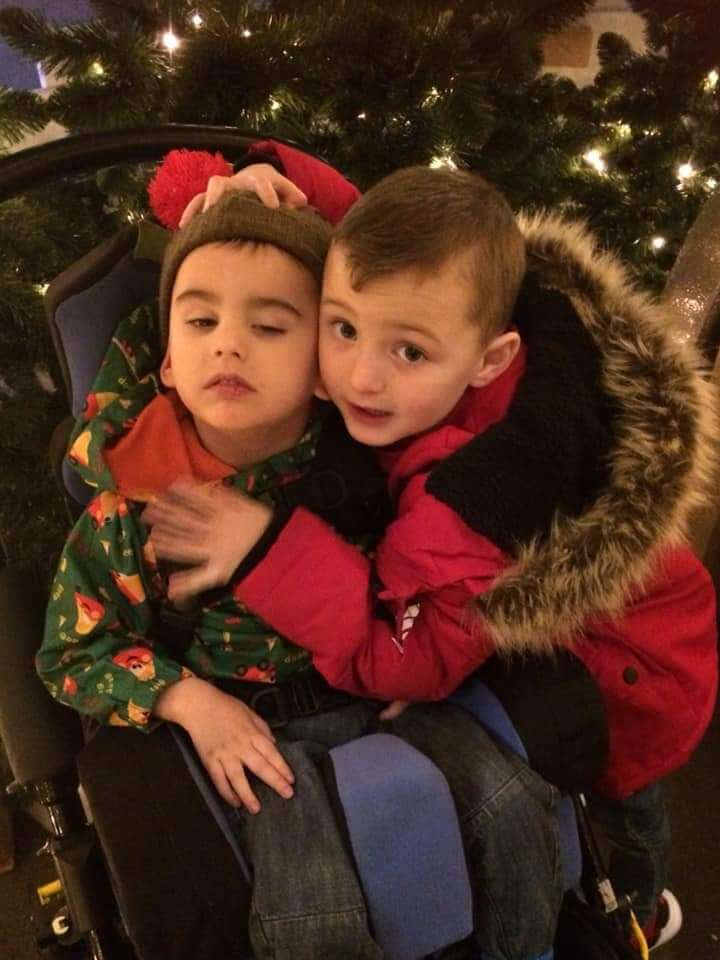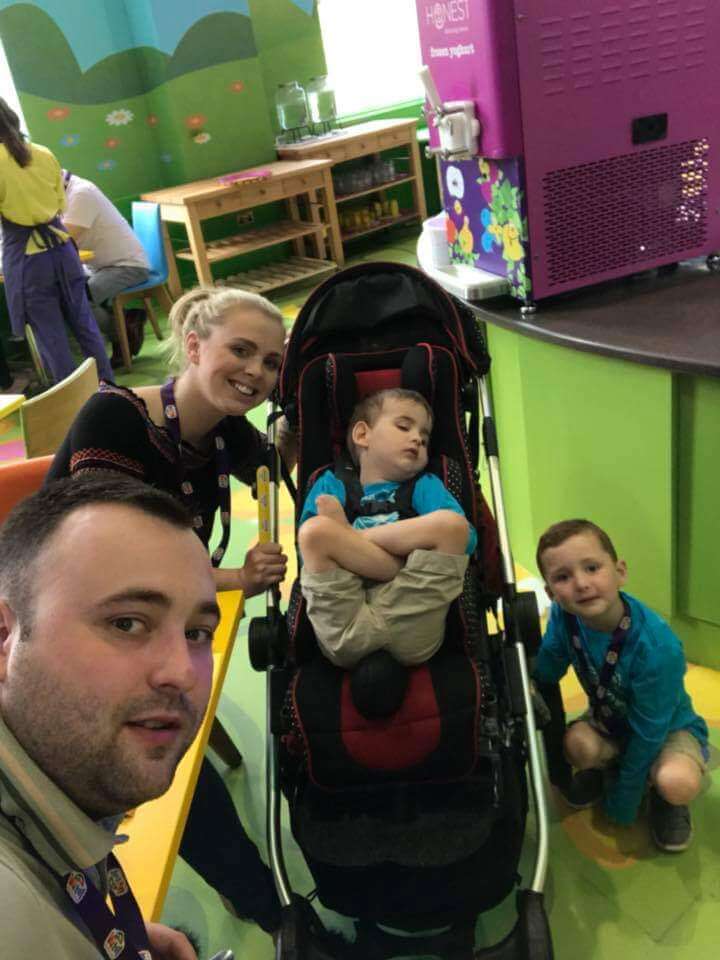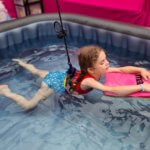
Carmela’s Story
Lucy Chillery-Watson, 44, is mum to Carmela, six, who has LMNA Congenital Muscular Dystrophy, a rare genetic form of the condition. 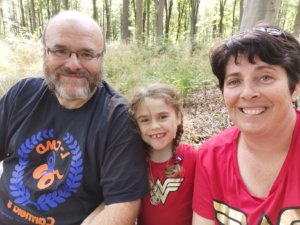 They live in Devizes, Wiltshire, with dad Darren, 49.
They live in Devizes, Wiltshire, with dad Darren, 49.
Lucy said: “When Carmela was born she wasn’t breathing, but the doctors managed to resuscitate her and she then developed as a normal baby.
“But when she wasn’t crawling by the age of 14 months I was concerned. Doctors told me it was hypermobility and not to worry, but she kept falling over and was struggling to reach her toys.
“She had her check with the health visitor just after she turned two and was referred to a physiotherapist as she did not have the strength to stand up.”
The physio told Lucy that her daughter was using the ‘Gowers’ sign’ to stand up, where children use their arms to push themselves to standing position. This is linked to Muscular Dystrophy.
Lucy said: “They tell parents not to Google but I couldn’t help it, and I was shocked by what I found. There are many types of muscular dystrophy but all of them lead to mobility problems of some degree. I didn’t know if Carmela would walk or what kind of life limiting effects it might have.”
Doctors continued to investigate, and by the time Carmela was three she was diagnosed with LMNA-Congenital Muscular Dystrophy (LMNA-CMD), a very rare form of the condition caused by a mutation in the LMNA gene.
The severity of how LMNA-CMD affects someone varies from person to person, but it causes muscle weakness which can lead to problems with the heart and breathing difficulties
Lucy said: “Because the testing had taken so long, by the time we got the diagnosis it was a relief to know what was wrong. I’d had almost a year to process and grieve the fact my little girl would not have the childhood I’d envisaged, and now we had a diagnosis we had something to work with.”
But LMNA-CMD is estimated to affect only one in a million people, which meant no-one really knew the prognosis for Carmela.
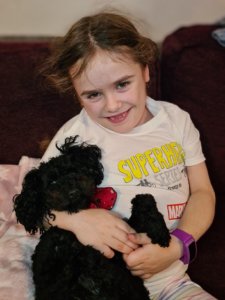 Lucy said: “We were told Carmela’s condition was life limiting and she was unlikely to live longer than her late teens, which was very hard to hear. We just put it to the back of our minds and decided to focus on doing what we can right now.”
Lucy said: “We were told Carmela’s condition was life limiting and she was unlikely to live longer than her late teens, which was very hard to hear. We just put it to the back of our minds and decided to focus on doing what we can right now.”
Lucy set up a Facebook page charting Carmela’s journey in an effort to connect with other families whose children have the condition, and made friends across the world, including in Italy, Germany and South Africa.
Carmela struggles to walk long distances or up hills and relies on her power wheelchair when the family go on a walk together. She has also started to lose her arm strength, meaning she cannot lift her arms to scratch her head, for example.
And as the condition progresses it can weaken the diaphragm, causing breathing difficulties, and can also weaken the muscles in and around the heart, putting Carmela at risk of a sudden heart attack.
Regular exercise, movement and stretching is important for Carmela to maintain her strength and stamina, but when lockdown hit, the family’s carefully built routine and the care they had in place was taken away overnight.
Lucy said: “Staying active, stretching and moving is very important for Carmela, but I found it very difficult to motivate her during lockdown. She was no longer going to school and we had to shield meaning we couldn’t go much further than our drive for five months.
“The NHS don’t provide regular physio anyway, but the little we had was lost.”
Their situation was made more difficult when they decided dad Darren, a delivery driver whose job involved picking up Covid samples, should temporarily move out and sleep in their garden log cabin allowing Lucy and Carmela to self isolate.
Lucy said: “It was a very difficult few months, but we tried to make the most of it. Carmela completed several fundraising challenges and raised more than £30,000 for muscular dystrophy charities, I was so proud of her.”
Carmela was on the waiting list for hydrotherapy sessions as her consultant had advised warm water is an excellent form of 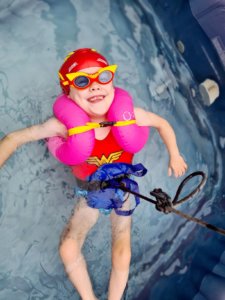 physiotherapy, so Lucy applied to The Sandcastle Trust for an inflatable hot tub they could use in their garden.
physiotherapy, so Lucy applied to The Sandcastle Trust for an inflatable hot tub they could use in their garden.
She said: “We were so excited to receive the hot tub. Carmela loves splashing about in there and all the bubbles. We’ve rigged up a bungee cord for her too so she can have some independence and I don’t have to hold her the whole time.
“The warm water is really helpful for me when I stretch her muscles, and makes her physio much easier. And Carmela and her dad love getting in there together so he can relax after work.
“It’s made such a positive difference to our daily routine and it feels like a real treat.”
Like many six-year-olds Carmela loves her pet dog Tinker, unicorns, fairies and movies. Her favourite character is Wonder Woman.
Lucy said: “Carmela loves the control Wonder Woman has over her body and the way she can use her super powers.
“Relaxing in the hot tub gives Carmela a sense of weightlessness, it’s a place where she has more control of her body too.
“Seeing her splashing around in her Wonder Woman swimsuit, enjoying the bubbles and the warm water is such a joy for us, and it’s very helpful for her physio too.
“We always try to make the most of the time we spend together as a family, and the hot tub has really helped us to achieve that.”

Jamie’s Story
Jamie Tyler was three years old when he died in April 2019 from the rare genetic condition Leigh’s Disease. Jamie’s family were gifted a stay in the CBeebies Land Hotel at Alton Towers by the Sandcastle Trust in his memory. Here Jamie’s mum Sam, 36, from Hereford, explains how much the trip means to them.
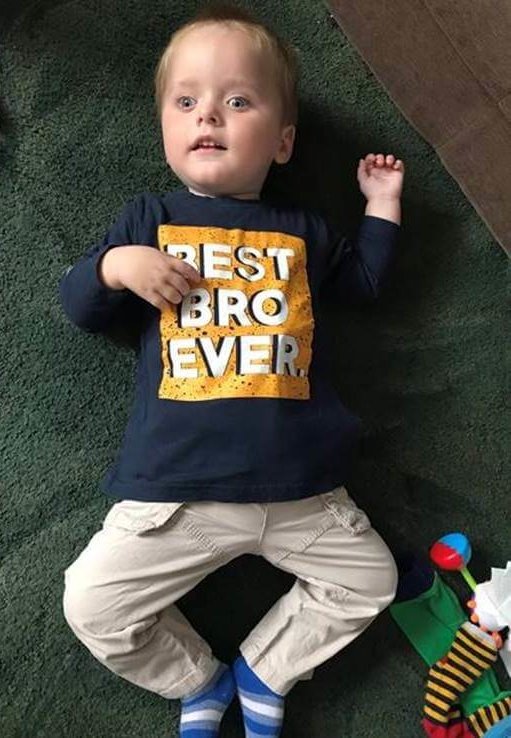
Sam said: “I had a normal pregnancy with Jamie, and he was my third child. He seemed to be developing normally until he was five months old. He had been starting to smile and babble, but I noticed he had stopped making noises and was no longer giving us his cheeky grin.
“Then he started to lose interest in food, he no longer wanted to hold his cup or eat his toast, and by his nine month check we couldn’t tick any of the boxes for the milestones he should have been reaching.
“We were referred to hospital in Birmingham, then a specialist centre in Newcastle, and by April 2016, when Jamie was 16 months old, we had a diagnosis of Leigh’s Disease.
“It’s a rare genetic condition that affects only 1 in 40,000 newborns. There are different variations of the disease, but doctors found out that Jamie had the mitochondrial type, which is passed on by the mother. I was tested and they found low levels in my blood, as well as in Jamie’s older siblings Sophie, who’s now 17, and Jack, who’s now seven.
“There is very little information available about what to expect, but we were later told Jamie would continue to become more and more poorly, and his life expectancy was just three years old.
“I was devastated at the diagnosis, I had felt it was something serious but neither me nor Jamie’s dad Barry had ever heard of this. You just think Jamie will get to 10, then he’ll get to 16, then we’ll see after that. But hearing we would only have another two years with him, together as a family, was a huge blow.
“I was already five months pregnant with our fourth child Rebecca by this point, and Barry and I knew that if she had the condition then we would deal with it, but so far she hasn’t shown any signs of being affected.
“Once we knew we didn’t have much time left with Jamie we decided to make as many memories and take as many pictures as we could.
“Barry and I got married with the children as bridesmaids and page boys, and we organised lots of days out for all of us. Jamie and his brother Jack were so close, and they loved watching CBeebies together. Jamie’s movement was limited and he couldn’t speak, but when the show Swashbuckle came on he would move his arm in the pirate salute and we knew he was enjoying it.
“We had planned to go and stay in the Swashbuckle room at the Alton Towers hotel, but sadly Jamie passed away before we could go on the trip.
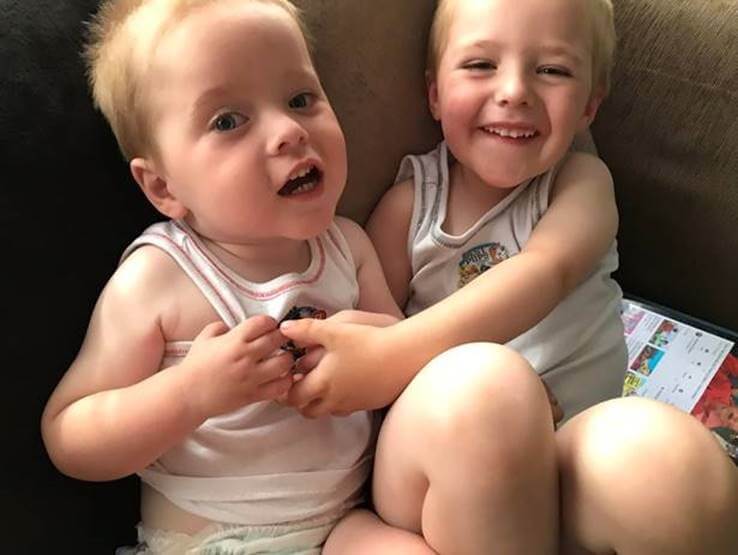 “Jack was devastated to lose Jamie, we all were. Jack did so much for Jamie and he never thought of himself or complained, he knew Jamie’s needs came first. Even now, when he looks up to the sky and sees a star shining brightly, he tells me it’s Jamie looking down on us.
“Jack was devastated to lose Jamie, we all were. Jack did so much for Jamie and he never thought of himself or complained, he knew Jamie’s needs came first. Even now, when he looks up to the sky and sees a star shining brightly, he tells me it’s Jamie looking down on us.
“Together with the pandemic it’s been an awful two years and I wanted to give the children something to look forward to. So when I contacted the Sandcastle Trust and they said they would organise the Alton Towers trip for us, and for us to stay in the Swashbuckle room, I was thrilled.
“Jack is so excited, and the first thing he said was that he wanted to make sure Jamie could go too. We all have pillows with a picture of Jamie on them, and Jack has already decided he’ll be packing his pillow so his brother will be with him.
“It’s still so important for us as a family to create memories together, given what we’ve all gone through. Life is too short to wait and I firmly believe in having fun, staying positive and moving forward.
“This trip will help us all to do that, and thank you so much to the Sandcastle Trust for giving my family something really special to look forward to.”
The Family’s trip to Alton Towers
`
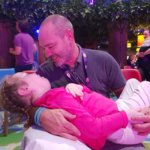
Kennedy’s Story
Kennedy Mercer was five months old when a rare genetic condition claimed the life of her twin brother Karter. Kennedy has the same condition, Spinal Muscular Atrophy Type 1.
Both twins were diagnosed with the disease before turning six-months-old. Babies with it usually die within two years, often as a result of serious breathing difficulties, but smiley seven-year-old Kennedy has astounded doctors with her fight for life.
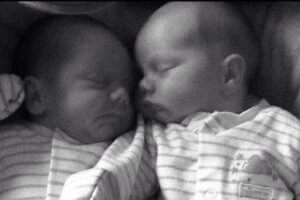
SMA Type 1 is a neuromuscular disorder which causes severe muscle weakness and progressive loss of movement. Babies with it are usually unable to sit upright unsupported or lift their head. They are prone to chest infections and have difficulty swallowing. All muscles are affected including the heart and lungs. Intelligence isn’t affected and babies are often bright, alert and responsive.
Karter and Kennedy were born premature in September 2012 after mum Jeannette, was diagnosed with preeclampsia. “The twins were well fought for, it was our eighth round of privately-funded IVF,” explains dad Paul, an HR executive from Grays, Essex.
“Other than arriving a little premature, everything was going well. Karter was two months old when I noticed he was crying through his feed and struggling to swallow. I noticed he hadn’t moved his legs in some time. We didn’t think for a minute he had a life-threatening illness but we wanted to get him checked so we took him to our local hospital in Basildon. He was given lots of tests and we paid privately for him to have an MRI scan in London. Everything came back clear.”
Doctors ordered one final test to check the nerve endings in Karter’s spine and it was then he was diagnosed with SMA Type 1.
“We were told, subject to blood tests, that doctors were 99 per cent certain he had SMA Type 1,” Paul explains. “They said there was nothing they could do for him and it was unlikely he’d make his first birthday. It was a life-changing moment. You start grieving right then when you are told your baby will die, even though he is still there, looking at you, smiling at you. You grieve for things you now know will never happen, such as seeing him kick a football, swim in the sea or run around the garden. I’d never heard of it before, I knew nothing at all about SMA.”
SMA is a recessive genetic disorder, meaning both parents must carry a faulty copy of the SMN1 gene for it to occur. If both parents are carriers – and research suggests one in 40 of us are – there is a one in four chance in each pregnancy that the baby will be born with SMA. Most people do not know they are a carrier until they have a child with the condition.
“We asked whether Kennedy might also have it and we were told that it was a possibility but the odds were in our favour,” Paul says. “She had a 25 per cent chance, the same as her brother. Kennedy’s blood tests were carried out in November 2012 but we asked not to be given the results until after Christmas. A few days afterwards, a local consultant turned up at our front door with a family liaison officer. We knew instantly she must have it, she was only four months old.”
The twins’ parents decided they’d give their children the best lives they possibly could – no matter how short. “We could sit at home crying and wondering why this happened to us,” Paul says. “Or we could do our best to give them the best quality of life we could.”
Sadly, Karter died of respiratory failure in February 2013 aged five months.
“He was in bed with me and I woke up about 2am to do his feed but he was cold and unresponsive,” Paul says. “I tried to resuscitate him. An ambulance arrived and paramedics took over, but we couldn’t get him breathing. I made a promise to him that night that we would ensure Kennedy had the best life possible. For a lot of people, it’s about keeping their child alive as long as possible but over time we realised that was not the be all and end all. We focus on making memories for her and making sure she has a brilliant life.
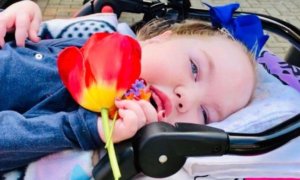 “I started doing more research and I flew to the US to meet one of the world’s leading specialists on palliative care for children with SMA. We had a challenge to get her the treatment we wanted but we pushed for her to have a drug called Spinraza. She started getting it when she was five and it’s made a huge difference to her life. If Karter had been given it at birth, he’d still be here now. It hasn’t been approved for all types of the disease, so we are lucky she got the drug. If it is given to newborns, SMA Type 1 isn’t necessarily seen as a terminal illness any more.
“I started doing more research and I flew to the US to meet one of the world’s leading specialists on palliative care for children with SMA. We had a challenge to get her the treatment we wanted but we pushed for her to have a drug called Spinraza. She started getting it when she was five and it’s made a huge difference to her life. If Karter had been given it at birth, he’d still be here now. It hasn’t been approved for all types of the disease, so we are lucky she got the drug. If it is given to newborns, SMA Type 1 isn’t necessarily seen as a terminal illness any more.
“With Kennedy, it has helped her to speak. She can sing songs. She loves Let It Go from Frozen. She has been able to express herself much better and it’s made her far more independent. She can draw, paint, go to school, go on days out and drive her own powered wheelchair.”
Kennedy is doing extremely well. She is home-schooled and goes into a local mainstream school on an ad hoc basis. “It is difficult to go regularly as there are so many bugs around and a simple cold could be life-threatening,” Paul explains.
Day to day, Kennedy’s parents ensure her airways are kept clear, which involves using a suction device every hour during the day. At night, she breathes through a ventilator. Kennedy is unable to eat or drink and all food is administered via a peg in her tummy. This allows food to go directly to her stomach, bypassing the most and throat.
She has regular checks at London’s Great Ormond Street Hospital, where she goes for her Spinraza medication, as well as weekly sessions with a physiotherapist.
Mum Jeannette gave up her job after the twins were diagnosed and is now Kennedy’s main carer. Paul works from home so he too can care for his daughter.
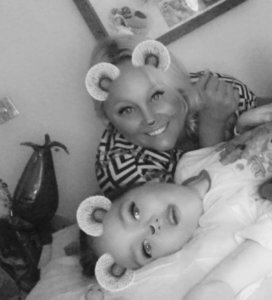
“After what happened with Karter, we decided to always keep her close to us,” he says. “She sleeps in bed with one of us. We don’t have any night care, but we take it in shifts so one of us is always by her side. Her brain works normally so sometimes she wakes in the night and wants to turn, but she can’t manage it. One of us has to physically turn her.”
“Most children of her age with SMA need a ventilator to help them breathe at all times, so Kennedy is very rare,” he explains. “When she is awake she can breathe by herself. On the whole she is doing very well.”
“She will never be able to walk, she’ll never sit up independently and she can’t play with her friends in a traditional sense. But she is one of the happiest children on the planet. She loves Disney and dressing up, she has every Princess outfit you could think of. She loves Barbie and playing with dolls just like many other little girls. She is at her best when she is surrounded by children her own age. She loves spending time outside in the garden, she loves swimming.
“We want to create as many memories as we can for Kennedy. She’s flown over 15 times, she’s been to Disneyland, she has swam with dolphins, fed giraffes, she’s been to the cinema and theatre. We want to give her as much independence as possible.”
The family have been supported by The Sandcastle Trust.
“The charity recently arranged for us to stay in the Cbeebies Hotel at Alton Towers which Kennedy loved,” Paul says. “She loved all the rides and meeting her favourite characters from the telly. The Sandcastle Trust do fantastic work with adults and children to try and create lasting memories.”
In 2016, Paul and Jeannette had a second daughter Marli, now aged three, after having pre-implantation genetic diagnosis (PGD) at Guy’s Hospital in London. This is a type of IVF which meant doctors were able to rule out the possibility of their baby having SMA Type 1.
“The doctors had to take DNA from all the family but the doctors could tell us with 99 per cent certainty before putting the embryo back in whether it was going to be SMA positive, an SMA carrier or have no SMA at all. We know Marli is a carrier, but we knew before she was born that she wouldn’t have the disease. The two sisters are as close as they come. The love they have for each other is second to none.”
Jeanette also has three elder children from a previous relationship, Courtney, 22, Kelsey, 18 – a regular on The Only Way Is Essex – and Bill, aged 19.
“We are not your average family but we are a very happy one,” Paul says. “Of course, I have spells when I 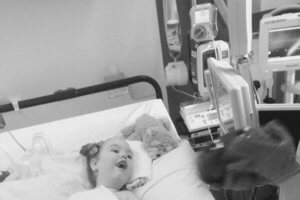 worry about the future. Most parents who look after a child with a rare genetic condition sometimes worry about what tomorrow might bring, especially if you are dealing with a condition where the life expectancy is two years or less. We know we could lose her at any time.
worry about the future. Most parents who look after a child with a rare genetic condition sometimes worry about what tomorrow might bring, especially if you are dealing with a condition where the life expectancy is two years or less. We know we could lose her at any time.
“We try not to think too far ahead any more, we live in the present. We try to make sure that every day is the best it could have been. I look in the mirror every night and question whether I have done the best for her that day. I feel blessed to have Kennedy. I may have saved her life many times but she has also saved me. My life is completely different now. I don’t worry about financial rewards, eating in nice restaurants or buying nice clothes. What matters to me is seeing my daughter happy. Of course, life can be hard sometimes, but I wouldn’t change her for the world.”
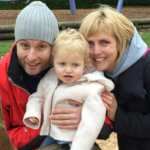
Tilly’s Story
“Our little girl Matilda, Tilly, was diagnosed with Rett Syndrome in March 2018.
Tilly had developed normally until she was one, with no concerns whatsoever, but then started to gradually lose her skills.
Rett is a rare genetic neuro-developmental condition affecting mainly girls leaving them profoundly disabled.
Rett means Tilly cannot walk, talk, use her hands, transition between postures, and needs 24-hour life long care for every single need.
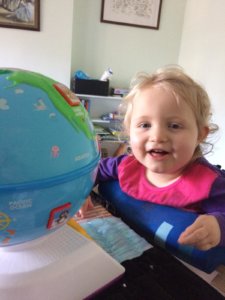 To say the news was devastating is an understatement and it has had a huge impact on our family – me, Tilly’s dad and Tilly also has a three and a half year old sister Thea, who we try and ensure is unaffected as much as possible by the diagnosis.
To say the news was devastating is an understatement and it has had a huge impact on our family – me, Tilly’s dad and Tilly also has a three and a half year old sister Thea, who we try and ensure is unaffected as much as possible by the diagnosis.
During the first few months we were left reeling, and bad news after bad news kept on coming at her various appointments; she may need a feeding tube, she might not walk and intellectually, she may not exceed the age of a 2 month old.
When Tilly started to have seizures and tremors things became really tough for our family.
So, when we discovered The Sandcastle Trust after looking through a handout given to us to find funding for a pushchair, we decided to contact them.
Through the Sandcastle Trust we were able to have a fantastic break in North Yorkshire, a day after a really important meeting to discuss Tilly’s educational needs.
We stayed in a brilliant caravan and had three days just us as a family, taking time to process what had happened, just get away and make it fun for Tilly and Thea.
They both loved it; we went to the children’s disco, the beach, the swimming pool which was amazing and everything was geared towards the children. It was a holiday we would never have taken and we loved it that much I am sure we will go back.
Tilly’s symptoms are now manageable, but every time we go anywhere we need to blend all her food, take all her medication, and equipment, and make sure she has everything she needs so she doesn’t get distressed or upset.
The place we stayed in was huge and so it meant that we could take along everything we needed.
A year on from her diagnosis, Tilly is thriving. Although Rett has had a significant impact physically, there is nothing to suggest that she is not the same age mentally as other two and a half year olds.
Going on this break took us away from the seriousness of everything, helped us gain a sense of hope and peace restored, which gave us the strength to carry on. The Sandcastle Trust made that possible for us and I will be forever grateful.
What The Sandcastle Trust do is give you space to be able to get away as a family and breathe. That is what we needed to be able to step back into the uncertainty of life and what it now means for us.
Thank you Sandcastle Trust for supporting us it meant and means the world to us.”
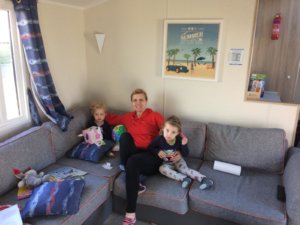
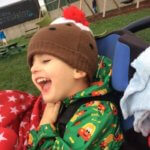
Jacob’s Story
When their baby son Jacob was diagnosed with a life-limiting genetic disorder parents Gemma and Kevin Rimmer knew their world had changed forever.
Gemma, from Liverpool, says: “We realised our gorgeous boy would need 24-hour care. I had to give up work as a hairdresser. Kevin had to leave a good job on the railways for something more local. Alder Hey Hospital became our second home.
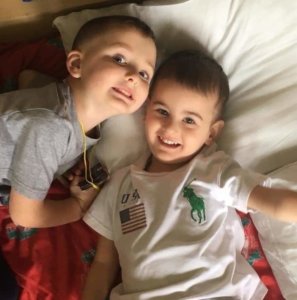 “For the first few months of Jacob’s life his older brother Joel was passed from one family member to the next while we sat by Jacob’s hospital bed.”
“For the first few months of Jacob’s life his older brother Joel was passed from one family member to the next while we sat by Jacob’s hospital bed.”
The idea of a holiday or a day out seemed completely unattainable.
Gemma says: “Kevin became a taxi driver so he could be near us in an emergency. Our income reduced considerably and all our spare time was spent entirely on the boys.
“So when the Sandcastle Trust offered us a break it was absolutely magical to be able to take them away for the night.”
The charity gave the family a trip to Alton Towers so Jacob, now three, and Joel, six, could visit CBeebies Land there.
Gemma says: “Seeing the excited looks on the boys’ faces at the CBeebies Live shows was something I will always remember. We stayed in the Mr Tumble room which is Joel’s favourite.”
When newborn Jacob was just two days old he suddenly stopped breathing. He was rushed by ambulance to Alder Hey Hospital in Liverpool and hooked up to a life-support machine. He remained in a coma while doctors urgently tried to figure out the cause.
Lumbar puncture tests showed his glycemic levels were high. Doctors diagnosed Nonketotic Hyperglycinemia (NKH).
Gemma says: “They told us Jacob would need a lifetime of care, he could have as many as 24 seizures a day. They told us to summon our family to say goodbye and suggested we switch his life support machine off.
“We knew we wanted to keep him alive. We felt that if he had wanted to die he would have gone before the ambulance arrived at our house.”
Jacob deified doctors’ expectations and eventually started feeding from a bottle. At three months the family were allowed to take him home. He now smiles and giggles, can say a few words, loves watching CBeebies and is learning to use a ‘switch’ toy to increase his motor skills.
NKH causes epilepsy, global mental delay and stomach problems and Jacob also has cerebral palsy. The family continue to spend long periods in hospital.
Gemma and Kevin have become used to the routine of caring for him.
Gemma says: “Jacob rarely sleeps so we take turns being up in the night. He is fed through a peg in his stomach. His first meal is at 6am. I give him all his medication at 8am while I’m getting Joel ready for school. Then Jacob will have a feed every four hours, four times a day.
“Nappy changing is always a fight, he rolls away from us.
She adds: “Someone said to me the other day “you don’t look like you any more”. I used to wear make-up and always have my hair done but I just don’t have the time now. I can’t remember the last time Kevin and I went out as a couple.”
The Sandcastle Trust has also helped Jacob and Joel visit Father Christmas in a local grotto two years in a row.
Gemma says: “With Jacob we take each day as a blessing so it’s always bittersweet to visit Santa, it marks another year he has survived.”

Cally’s Story
Mum Cally Benvie, 30, from Broughty Ferry, Dundee, is a wheelchair user after being diagnosed with the degenerative genetic disorder Friedreich’s Ataxia as a teenager.
She enjoyed a blissful weekend Center Parcs in Whinfell Forest, Penrith, with partner Alan Moffatt, 33, an NHS porter, son Jay, 10, mum Jill, a nurse, and her mum’s partner George.
The trip, organised by The Sandcastle Trust, enabled her family to be just that, a family and not have to worry about Cally’s disability for the first time in a while.
Chatty Cally says: “It’s not often I’m speechless but the holiday was so incredible I am lost for words. It was the first family break we have had since I had to use the wheelchair full time.
“I’m crying as I say this. A lot of Alan’s attention has to be on me but going away with my mum meant Alan and Jay could do whatever they wanted without having to worry about me. Jay could come first.
“It was fantastic as a mum to see how much enjoyment my son got out of the weekend. It felt like we weren’t focused totally on me having a disability we could just focus on being a family. It was magical.”
a disability we could just focus on being a family. It was magical.”
Friedreich Ataxia causes progressive nervous system damage and impaired muscle coordination that worsens over time. It was Cally’s dad who first spotted there might be something wrong with his daughter’s movement.
She explains: “Dad lives in Wales so I didn’t see him regularly. I was visiting him and he asked me ‘What’s wrong with your legs? You’re walking strangely.’
“I hadn’t noticed and told him not to worry but he was so concerned he insisted I saw a doctor when I got back to Scotland, which I did.”
Suspecting a brain tumour, Cally’s GP sent her for an MRI scan straight away. The results were negative so the doctor sent Cally’s blood for genetic testing. She recalls: “I thought I might have something I could take a tablet for and it would go away, something manageable. But it wasn’t.
“The doctor told me it was Freidreich Ataxia then gave me a leaflet he had printed from the internet and a website address.
“I’d never heard of it and didn’t think too much of it. I had my lunch and went back to work.”
Cally Googled the condition. She says: “That was a mistake. Google had me dying in a couple of years, it still didn’t sink in. My mum was doing the same thing and was horrified. It was when I told my mum and she got upset that I realised it was more serious.”
Cally had only just met Alan at the time. She recalls: “19 is an awkward age to be told you have a life-changing condition. Alan could have walked away then and there but he’s stuck with me. He’s been a great support.
“I don’t think I would be doing as well without him. He’s a really good listener. I found a good one there.”
The first time Cally remembers FA impacting her came a couple of months after her diagnosis. She says: “I met Alan on a Friday after work. The doorman at the bar where we were going said: ‘You’re not coming in, you’re too drunk.
“Then he said to Alan: ‘You need to get her up the road pal. She’s had too much.’
“I explained I had come straight from work and hadn’t had a drink. I was angry he wouldn’t speak to me but over my head to Alan. He wouldn’t let me in. He said I was making it up. It would have been a bit of a thing to make up.
“I’ve never been back there.”
“Now my balance and coordination aren’t great and my speech can be quite slurred. It’s got worse over the years but because I use the wheelchair all the time now everyone knows I’m not drunk.”
Jay was born in 2011 and the family have learned to live with Cally’s condition. Cally says: “Jay is very understanding and a big help around the house when Alan’s at work, small things like getting something from the fridge or closing the blinds. He is always happy to help me.
“When he was younger he would just tell his mates ‘my mum’s a bit wobbly’ and they would carry on playing. I’ve found children are a lot more accepting than adults.”
She says: “I can’t walk by myself any more but we get by. We live in an adapted house with a ramp. I use a wheelchair all the time in the house.”
“My condition is progressive but I am quite a positive person. Like everyone you have the odd day when you’re not doing so well.”
Cally was furloughed from her office job during lockdown. Researching an accessible holiday to cheer the family up she stumbled across the Sandcastle Trust. She recalls: “Most charities are based around children, certainly ones for genetic disorders. But my disorder impacts my family.
“I was tearing my hair out with homeschooling. It was so lovely and reassuring to talk to Danielle from the Trust, she understood.
“She suggested Center Parcs and kindly agreed that Mum and George could come too.” 
The family travelled in July 2021 at the start of Jay’s school holiday.
Cally says: “After Covid it was amazing to be away from home. It was like a dream.
“My mum and I don’t get much time together but we got to have afternoon tea. The boys went swimming without the additional pressure of me in the wheelchair.
“Alan and Jay are very good, they would never say I’m an issue but they could have quality time together.
“We stayed in a wheelchair-adapted lodge. All the counters were at my level. The shower had a shower chair, my bed was a hospital bed. We didn’t have the hassle of bringing any additional disability things with us.
“It was the most incredible weekend. If I was a millionaire I would be there every week.
“Jay loved all the activities, there’s wildlife, tennis, badminton, shops and restaurants. But his fave things were the nights we were back in the lodge and we played board games and ate pizza.
“We would recommend it to anyone. The staff couldn’t do enough for us. They took my disability seriously but it felt really, really safe and still like a holiday.
“Words aren’t enough to explain how grateful we are to everyone at Sandcastle.”

Alfie’s Story
Alfie O’Brien, 13, was born with a rare genetic eye condition, which means he has no vision. He also has autism and complex behavioural needs, including extreme self-harming.
In July 2021 Alfie had surgery to remove an eye and after recovering from the operation he wasn’t able to return to his special needs school.
This isolation from school routine and his friends hit Alfie hard, especially following on from school lockdowns during the coronavirus pandemic. For Alfie in particular, structure, routine and contact with his peers help with his autism and behavioural needs.
Such a difficult year led to trauma for the teenager, an escalation in self-harming and was hugely stressful for Alife’s parents Cara, 41, and Stephen, 45, who live in Liverpool. Alfie has a range of health issues. He can walk with a cane but needs to use a wheelchair for longer distances. He has a feeding tube and is incontinent. He also has global development delay, speech delay and sleep disturbances. His parents care for him full time.
Cara says: “Alfie has no vision at all as a result of the genetic eye condition Leber congenital amaurosis. He also has severe self-harming and part of that means he pokes his eyes. He damaged one eye through poking, the retina detached, and he had eye removal surgery in July 2021, an horrendous operation. He was then excluded from school, and I can’t explain how broken our family was after. He was traumatised from not being to say goodbye to his friends and he also kept saying ‘I want a new eye’.
“The Local Education Authority applied for a school within a three-mile radius and all turned him down because of his complex needs. It broke my heart to see him out of school and the most challenging part is watching your child hurt themselves. He was self-harming all day, it was relentless; head butts or kneeing himself in the head. He is quite a frustrated little boy and a lot of it is through lack of communication. He also poked his ear so badly – to shut out sensory noise – he was at risk of damaging his hearing. It is a fear of mine that he will become deaf as well as blind.”
After such a difficult year, Cara, who also has two daughters Anya, six and Lauren, 20, was determined to make Alfie smile when he celebrated his 13th birthday in March.
Searching online for special magical days out and memories for children, Cara came across information about The Sandcastle Trust which provides support and memory making trips and experiences for families living with a rare genetic condition. Our aim at The Sandcastle Trust is to help families build lasting positive family memories, strengthen their family relationships, and improve emotional wellbeing and resilience.
At The Sandcastle Trust we discussed with Cara what would help Alfie relax and have fun at home, a sensory toy or piece of equipment that could fit in with family life. We suggested the TFH Foldaway Swing Frame, which is a piece of garden equipment robust enough to take up to 140lbs and can be folded away for storage. It arrived in time for Alfie’s 13th birthday and the family were treated to plenty of birthday smiles!
“The swing is just amazing,” Cara says. “It is great to see Alfie smiling as he swings and spins! We never thought that The Sandcastle Trust would gift us this. He loves the movement of the swing and the spinning – when he was younger he loved fairground spinning cups. Our occupational therapist says the spinning action gives him a sensory feedback. Alfie also uses it as a bed, he likes to chill out in the garden and listen to the birds. We spend a lot of time at home so this swing is amazing to have. What is also great is we can fold it up when we need to, as we have a small garden.”
Cara adds: “Alfie has just started in a new school (July 2022) and although it is going to take a long time to work through his trauma, he is so happy to have a school now. We are rebuilding on the trauma with lots of cuddles, physical and sensory stimulation and we have seen a change in Alfie’s behaviour.
“He is a lot calmer and he smiles more. He has an amazing sense of humour, he is so funny, loves listening to music and he loves cuddling. We can take him out of the house a little. Before we couldn’t leave him alone with his little sister Anya, but now they cuddle all the time and even had a sleepover. Slowly, slowly we are getting there, and I hope it will improve.”

Karen’s Story
Karen Clark, 46, from Horsham, West Sussex, has spinocerebellar ataxia type III (SCA 3), a hereditary genetic condition which affects balance, walking, grip, speech, swallowing and ultimately breathing. It is a life-limiting condition and Karen, who was diagnosed at the age of 30, is in the later stages of the disease.
Karen lives in Horsham, West Sussex, with husband David, 47, and children Annabelle, 19 and Theo, 15. She was diagnosed in 2007 with SCA 3, a condition which her own mother died from at the age of 59. Karen’s older brother, who lives in Canada, also has the genetic condition. The couple’s children haven’t had a test for the condition yet.
SCA 3 is more commonly known as Machado-Joseph Disease (MJD-III). It is a rare, inherited ataxia (lack of muscular control) affecting the central nervous system and characterized by the slow degeneration of areas of the brain which contain most of the brainstem and cerebellum.
Most people experience symptoms between the ages of 40 and 70 and the disease progresses slowly. Symptoms include unsteady gait, loss of muscle mass and difficulty coordinating movements of the arms and legs.
For Karen, as her fine motor skills have deteriorated, along with her speech, she has found it difficult communicating over a small mobile phone with their family who live all over the world.
That’s where we at The Sandcastle Trust were able to help. At The Sandcastle Trust we provide support and memory making trips and experiences for families living with a rare genetic condition. Our aim is to help families build lasting positive family memories, strengthen their family relationships, and improve emotional wellbeing and resilience.
Through our Sandcastle Connections programme of support we gifted Karen an iPad, so she is able to communicate with her brother, who lives in a nursing home for young adults in Canada, and other relatives in Australia and New Zealand.
David Clark, an IT consultant, currently caring full time for his wife, says: “The first sign Karen had was when she was 30 years old and started tripping over and dropping stuff. We put it down to the post-natal period, but it was spinocerebellar ataxia. Karen’s condition is similar to motor neurone disease in some ways and like Parkinson’s she has muscle spasms, shakes and problems with her eyesight. It is very progressive, there is no cure and no treatment. The cerebellum is slowly dying.
“Now Karen fully uses a wheelchair, and her dexterity has got much worse. Sometimes I need to feed Karen, her speech is going, and she gets very tired. She needs personal care. It is very hard, and it is an absolute nightmare to get a carer who lasts. Eventually with this condition it stops your lungs from breathing.
“Karen was finding text messages, social media and face time very difficult to do as the buttons on a mobile are very small and that’s difficult with her reduced dexterity. Her eyes can’t focus on a small screen either. Karen’s occupational therapist recommended an iPad.”
The iPad has opened up communication for Karen and her whole family, enabling her to stay connected with family members and improving her mental wellbeing and emotional health, and reducing isolation. Karen plays interactive games online with her family, such as scrabble and is able to send emails and messages more independently, without being solely dependent on her family to do them for her.
“The iPad has helped a lot because it allows Karen to communicate,” David explains. “On an iPad the buttons are bigger so it’s not as fiddly. She can focus on the screen, which means she gets to read messages from friends and family who email her, and she can FaceTime them. It really makes a big difference.”
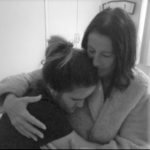
Maisie’s Story
Sixteen-year-old Maisie Doswell suffers from such debilitating headaches she has to spend most of the day lying flat on her bed. Maisie has the rare genetic disorder Myhre Syndrome, of which there are only thought to be 30-40 reported cases worldwide.
From the age of seven she has suffered from excruciating headaches – caused by a build-up of fluid in her 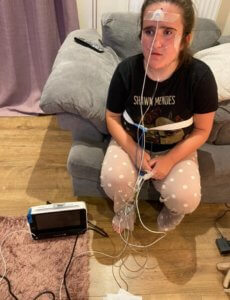 brain. She has had a shunt fitted in her lumbar spine to drain the fluid. It drains when she is upright and is causes terrible headaches on draining. Lying flat is the only way Maisie can get any relief from the pain.
brain. She has had a shunt fitted in her lumbar spine to drain the fluid. It drains when she is upright and is causes terrible headaches on draining. Lying flat is the only way Maisie can get any relief from the pain.
Mum Karey Mason explains: “At the moment she is just a teenager in a bed unable to get up for more than half an hour because of the headaches. Painkillers don’t work. She begs me for help, what can I do?”
When Maisie Doswell was born in 2003, doctors immediately picked up at birth that she could have a genetic disorder.
“My pregnancy was perfect,” Karey recalls. “Then, as soon as I’d given birth, the room filled with doctors. Maisie had low set ears, sunset eyes, which means she couldn’t look upwards, and a Palmar crease – which is a single crease across the palm of the hand. I was so tired I didn’t take anything in. At first, the doctors thought she had Down’s Syndrome, but that test came back negative. She spent four days in hospital and then we went home and we waited for a paediatric referral.”
Karey, 39, from Rye, East Sussex and her then partner Ivan Doswell, noticed that Maisie was slow to meet her milestones, particularly slower to crawl, walk and talk.
At four-years-old Maisie said her legs were hurting and Karey had to rush out and buy a buggy for her to use. Then at the age of seven Maisie went through an early puberty. At the same time, she suffered excruciating headaches.
Maisie was referred to Kings College Hospital, where they diagnosed intercranial hypertension – caused by a build-up of fluid in the brain. She had a shunt inserted into her brain and since then has been re-shunted over ten times.
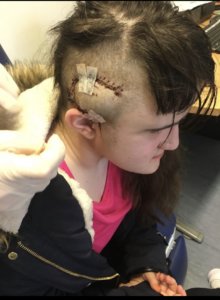 Since the age of seven Maisie’s health has deteriorated. She has lost the hearing in one ear and due to a lack of blood supply at the back of her left eye she has lost the total vision in that eye. Her vision in her right eye isn’t 100% and doctors are battling to save the sight. She now has a lumboperitoneal shunt which drains fluid from her brain into her abdomen. If the fluid in her brain isn’t drained sufficiently she risks losing the remaining sight in her right eye.
Since the age of seven Maisie’s health has deteriorated. She has lost the hearing in one ear and due to a lack of blood supply at the back of her left eye she has lost the total vision in that eye. Her vision in her right eye isn’t 100% and doctors are battling to save the sight. She now has a lumboperitoneal shunt which drains fluid from her brain into her abdomen. If the fluid in her brain isn’t drained sufficiently she risks losing the remaining sight in her right eye.
Maisie had been referred to a geneticist who suspected she had Myhre Syndrome. It took two and a half years for genetic testing to come back positive.
Myhre Syndrome is an extremely rare genetic disorder, with only 30-40 cases reported worldwide. It is caused by a genetic misprint in the SMAD4 gene on chromosome 18. The majority of cases occur spontaneously at conception, as was the case for Maisie. Myhre Syndrome affects children differently. It can cause respiratory and cardiac problems, delayed development, loss of hearing and vision. Each person with Myhre Syndrome have a 50/50 chance of passing it on to their children.
“At least now we knew what the reason was,” Karey, who is Maisie’s carer, explains. “However, not a lot is known about the condition. Maisie looks like a normal teenager, although she is just 4ft 6” and has size one feet, but it has affected her life massively. She has gone from being relatively healthy to progressively getting worse.
“Maisie hasn’t been at school for almost four years. She has learning difficulties and is academically and socially behind other children. It hurts her head to do anything other than lie flat. It feels like the worst hangover headache. She doesn’t want to go blind, so she must have the drain in to relieve the pressure build up. When she is upright or walking around the fluid drains and that is excruciating. Maisie won’t talk about what she is going through. She loves to knit and listen to pop music.”
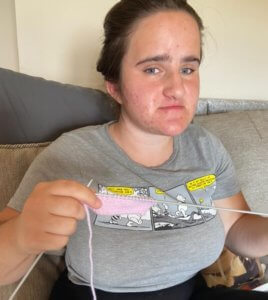
Karey adds: “If the doctors set the shunt higher, Maisie wouldn’t have the headaches, but her eyes won’t cope, and she would go blind. It is a horrible option to give a child. Either go blind or live with excruciating headaches. What is scary is that a couple of children with Myhre have passed away.”
In 2009 Karey married Darren Mason, 46, a fencer and coastguard. The couple have two healthy children, Charlie, seven and Lily, six.
“It is a strain on the whole family as we’re not able to go out with Maisie,” Karey explains. “Every day is difficult, we just have to take it in our stride. It is a worry what will happen in the future. It is a scary place to be.”
Maisie and her family have had support from the Sandcastle Trust, “The Sandcastle Trust has been amazing,” Karey explains: “A day out is a struggle for us but for other children it is a stress-free experience. The Sandcastle Trust is there to help. We had a lovely Christmas day out to Bedgebury arranged by the charity. They also organised for Maisie and our family to have a wonderful weekend in London. We stayed in a central hotel and visited The London Dungeon and Shrek’s Adventure – Maisie was so excited!
“Without The Sandcastle Trust, the world would be a bleaker place for families affected by a rare genetic condition.”
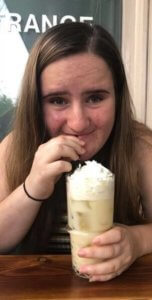

Tayen’s Story
Tayen Gilbert, seven years old, is funny, clever and crafty. She knows just how to keep her family on their toes.
Tayen, has Neurofibromatosis (NF1), which causes tumours to grow along her nerves. As a result of her tumours, Tayen is fully blind and is brain damaged. She also has complex epilepsy and has hydrocephalus – swelling of the brain due to excess fluid.
Despite everything, she loves telling jokes, tobogganing, audio books and playing with Lego Duplo.
Her mum, Kali, 37, says: “Tayen keeps us all going. She is just so loveable. Anyone who meets her is so taken with her.”
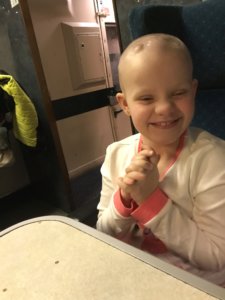 The Sandcastle Trust arranged for Tayen and her family to go on a special train ride at Christmas – it gave them a rare opportunity to enjoy the build up to the festive period in a safe environment where Tayen would be comfortable.
The Sandcastle Trust arranged for Tayen and her family to go on a special train ride at Christmas – it gave them a rare opportunity to enjoy the build up to the festive period in a safe environment where Tayen would be comfortable.
Kali continues, “In some areas Tayen is age appropriate, but in other areas she is naturally a little behind. It is very hard to pick apart what is going on inside her brain because of all the damage the tumours have done in there.
“We always used to do day trips with the boys, but it has become increasingly difficult managing her needs out in the community.
“Tayen’s mobility is now really poor, because of all the chemotherapy she has undergone and the tumour growth. Her mind is very active, but her body lets her down. Loud noises worry her, if it’s windy her hearing is affected and she has regular seizures.
“When she gets seizures her behaviour changes because she is in constant pain. She has a wheelchair buggy because her legs give way. It is really frustrating for her.”
Kali has three older sons, Matthew, 14, Connor, 12, Lucus, 12, and is married to Kevin, 40 a lorry driver. The family live in Bridgewater, Somerset.
The family used to have an annual tradition of doing a festive outing but since Tayen’s condition became more challenging they had found it harder to get out into the community.
Kali applied to The Sandcastle Trust for a family trip on the Dartmoor and Weardale Railways Train to Christmas Town. It’s a festive train ride that she knew would be the perfect outing for her sons and daughter.
She explains: “The whole application to The Sandcastle Trust was very quick and easy. I filled in a form in 15 minutes. It was completely stress free.
“We were so grateful that we were able to do a trip as a family so close to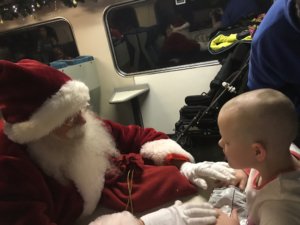 Christmas. That really helped with the magic. Tayen was still on chemo so we really didn’t know where we were going to be.
Christmas. That really helped with the magic. Tayen was still on chemo so we really didn’t know where we were going to be.
“The trip itself was wonderful. All my little family in the same carriage which really helped with Tayen’s anxiety. We were able to enjoy the moment, the hot chocolate and the singing. It was lovely.
“Because you are contained in the carriage, I knew Tayen would be comfortable and that the boys would want to go too.
“Sometimes Tayen’s anxiety is so bad I can’t get out of the house. So as a family we are split up most of the time.
“It affects everything really – our sons have grown up missing out on a lot despite all our best efforts. Take parents evening for example – I can’t always get out of the house if Tayen’s anxiety is bad.”
Kali, who was a teaching assistant at a special needs school, says: “I had to give up work to be there for Tayen whenever she needed me.
“She is pretty independent and has chores around the house just like her brothers. We encourage her constantly and love the fact she is inquisitive and wants to try things.
“We will always be so grateful to The Sandcastle Trust for giving our family such a wonderful opportunity. We created memories with all of the children which is so special given the uncertainty of the future.”





